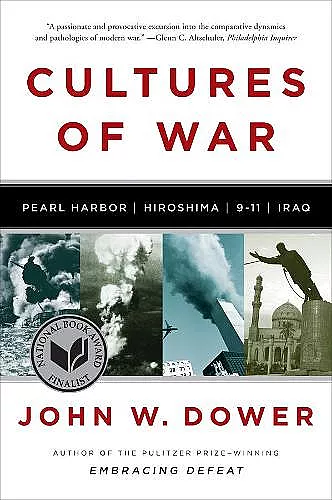Cultures of War
Pearl Harbor / Hiroshima / 9-11 / Iraq
Format:Paperback
Publisher:WW Norton & Co
Published:12th Sep '11
Currently unavailable, our supplier has not provided us a restock date
This paperback is available in another edition too:
- Hardback£23.99(9780393061505)

Over recent decades, John W. Dower, one of America’s preeminent historians, has addressed the roots and consequences of war from multiple perspectives. In War Without Mercy (1986), winner of the National Book Critics Circle Award, he described and analyzed the brutality that attended World War II in the Pacific, as seen from both the Japanese and the American sides. Embracing Defeat (1999), winner of numerous honors including the Pulitzer Prize and the National Book Award, dealt with Japan’s struggle to start over in a shattered land in the immediate aftermath of the Pacific War, when the defeated country was occupied by the U.S.-led Allied powers. Turning to an even larger canvas, Dower now examines the cultures of war revealed by four powerful events—Pearl Harbor, Hiroshima, 9-11, and the invasion of Iraq in the name of a war on terror. The list of issues examined and themes explored is wide-ranging: failures of intelligence and imagination, wars of choice and "strategic imbecilities," faith-based secular thinking as well as more overtly holy wars, the targeting of noncombatants, and the almost irresistible logic—and allure—of mass destruction. Dower’s new work also sets the U.S. occupations of Japan and Iraq side by side in strikingly original ways. One of the most important books of this decade, Cultures of War offers comparative insights into individual and institutional behavior and pathologies that transcend "cultures" in the more traditional sense, and that ultimately go beyond war-making alone.
"Consistently perceptive." -- Washington Post
"A whopper of a book in both length and intellectual substance. . . . The chapters on the U.S. incendiary and atomic bombing of Japan and the start of the nuclear arms race could stand alone as the wisest current treatment of that vexed history." -- Michael Sherry - American Scholar
"Consistently perceptive." -- Gerard De Groot - Washington Post
"A lucid and compelling example of how to learn from history, rather than using it as an ideological weapon." -- Drew DeSilver - Seattle Times
"Supplemented with visual images that are texts in themselves, Dower’s book is a passionate and provocative excursion into the comparative dynamics and pathologies of modern war." -- Glenn C. Altschuler - Philadelphia Inquirer
"It takes a nimble mind, and a nimble hand, to link America’s regrettable atrocities in the Philippines (whole villages were burned to the ground and their occupants slaughtered) to the events in Iraq. But Dower has the mind and the hand, making a compelling case that, regardless of righteousness, nations with a culture of war will, indeed, wage war. Dower’s wide-ranging, thought-provoking book is less an analysis of policy than a dissection of actions and the arguments that framed them…Dower’s arguments are deeply, and compellingly, drawn." -- Scott Martelle - Los Angeles Times
"Distills a lifetime of reflection and scholarship, persuasively connecting aspects of the ‘War of Terror’ to Pearl Harbor and Hiroshima, the better to illuminate the kind of wishful thinking—regardless of cultural difference—that is characteristic of modern warfare." -- National Book Award citation
"Dower has found much new and revelatory to tell us about the inanities and horrors of the Bush/Cheney years, and this book goes much deeper—and raises devastating questions about the history we think we know." -- Seymour M. Hersch, author of Chain of Command: The Road from 9/11 to Abu Ghraib
"A profoundly sobering reflection on war and the many cultures of self-delusion that we, like all other mortal nations, continue to ignore at ever deepening peril." -- Gar Alperovitz, author of The Decision to Use the Atomic Bomb
"An unrelenting, incisive, masterly comparative study." -- Kirkus Reviews (starred review)
- Short-listed for National Book Award 2010
ISBN: 9780393340686
Dimensions: 234mm x 155mm x 30mm
Weight: 800g
640 pages